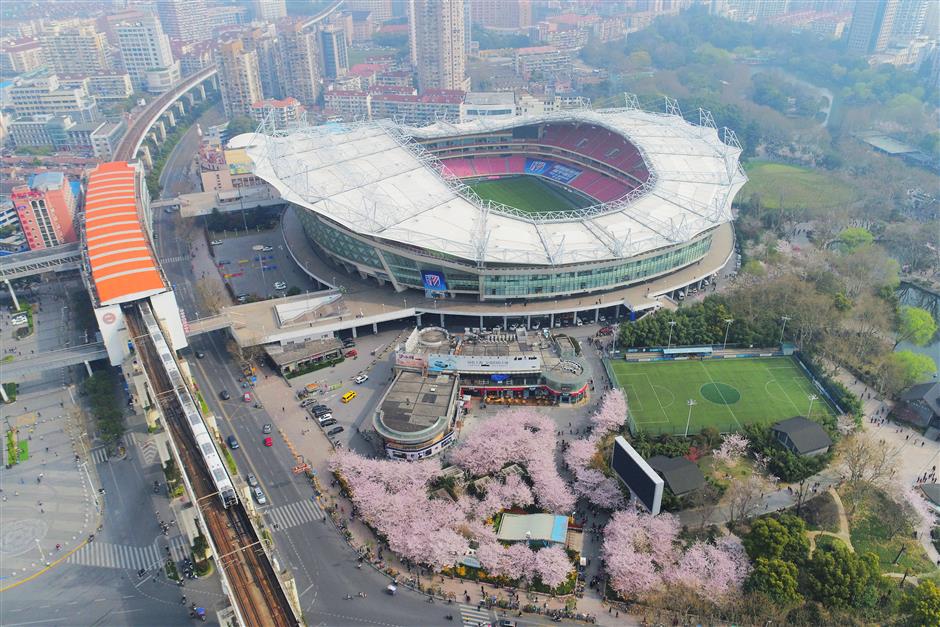
A bird’s-eye view of the Hongkou Football Stadium, China’s first professional football stadium, built in 1999. It will be developed into a world-class arena as well as a sports-related shopping and recreation center.
The football stadium in Hongkou District, the first professional venue of its kind in China, will undergo renovations to become a “football and sports landmark,” along with redevelopment of a nearby commercial street.
Hongkou Football Stadium, built in 1999, will be developed into the “world’s top sports arena” as well as a sports-related shopping and recreation center, said Zhao Yongfeng, the director of Hongkou District.
“The stadium’s facilities are aging after decades of operation and cannot meet the requirements of a professional football game,” Zhao told an interview with the city’s radio station over the weekend.
The district has invited designers from the US, Germany and Japan to turn the stadium into a venue for world-class football matches, as well as other sporting events, Zhao said.
Meanwhile, commercial sites around the stadium, including the CapitaLand Hongkou Plaza and the Sichuan Road N. commercial street will be redeveloped to revive the former glory of this north-downtown shopping hub, he said.
The stadium has 35,000 seats and now serves as home turf for the Shanghai Greenland Shenhua football club.
Its field and facilities will be upgraded to attract more football matches and other sports events, such as events for the US-based Major League Baseball.
Furthermore, public gymnasiums with the latest equipment will open at the stadium along with a swathe of stores selling sports products, according to the district government.
“The stadium is targeted at becoming a landmark for Shanghai’s football culture and spirit,” Zhao said. It will also become a sports industry cluster with global influence, he added.
Public sports activities, such as half-court basketball, jogging and orienteering will also be held in nearby Luxun Park.
Some urban redevelopment projects will be carried out on the stadium’s nearby Sichuan Road N., once one of the most popular commercial streets in Shanghai in the 1980s and 1990s.
The street has lost its former popularity and bustle in recent years thanks to the rise of online shopping.
Construction on a key commercial complex covering about 200,000 square meters will soon kick off in the north part of the road. Some historical buildings will be preserved and incorporated into the project, the government said.
The Hongkou government has also organized a league among traditional business operators along the street to jointly upgrade and develop the area.
“The Sichuan Road N. will become a consumption hub where consumers can dine, be entertained and shop,” Zhao said. “It’s not an easy mission to restore its former glory but we have the determination.”
Furthermore, many nearby historical and cultural sites will also be highlighted to attract visitors to the Sichuan Road N. area, the government said.
Historic venues, mainly along the road, will be renovated to showcase China’s revolutionary and cultural history from the 1930s.
The area near the commercial road has 57 historic sites. They include the Memorial Site of the 4th National Congress of the Communist Party of China, the League of Leftist Writers Museum, and homes of renowned writers and intellectuals from the turn of the previous century.
The old league building is tucked away on Duolun Road, which during the 1920s and 1930s was home to a community of famous writers and artists, many of whom joined the league.
